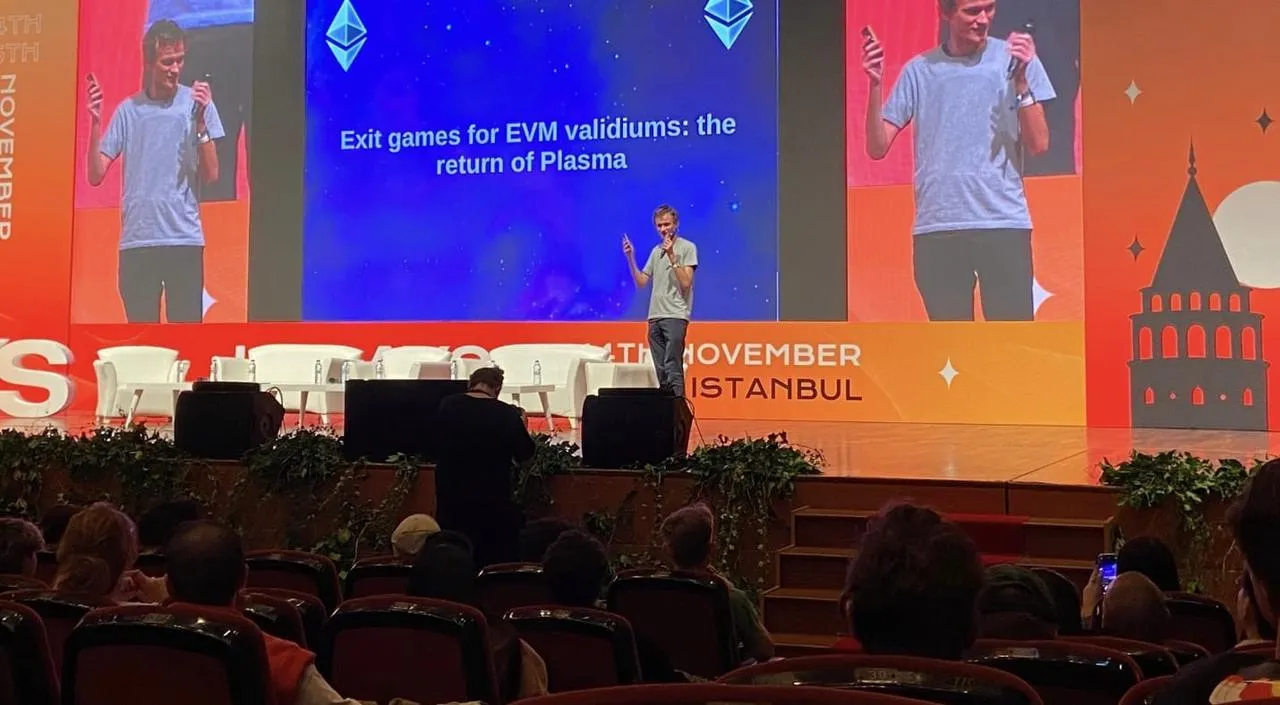In November, Turkey took center stage in the crypto market’s excitement. The scheduled Binance Blockchain Week and Devonnect 2023 conferences successfully unfolded, drawing participants such as developers, founders, influencers, traders, institutional investors, and regulators from across the globe to Istanbul. The focal point of the gatherings was a thorough discussion on the future of blockchain and Web3.
On November 8, 2023, Jordan, co-founder of UXUY, took the stage as a speaker at Binance Blockchain Week and engaged in his first conversation with Binance’s newly appointed CEO, Richard Teng. The following day, during Binance Blockchain Week, Jordan presented an innovative speech titled “UXUY Connects Bitcoin and BNB Ecology.”
Subsequently, on November 13th, the UXUY team actively participated in the Devonnect conference. They not only attended sessions where Vitalik Buterin shared his latest perspectives on Plasma but also engaged in a lively and insightful discussion with fellow encryption practitioners.
Istanbul has organically evolved into a focal point for the convergence of ideas between Eastern and Western encryption practitioners. UXUY expresses great enthusiasm for being in Turkey and participating in these two significant events. This article aims to provide a fresh perspective from Istanbul, capturing the essence of the experiences shared by UXUY during these engagements.
Speech by Richard Teng
Binance’s newly appointed CEO, Richard Teng, delivered an impactful speech that resonated with the UXUY team, emphasizing the promising future of decentralized finance. During the conference, Binance officially introduced the Web3 wallet, with Richard Teng showcasing its application interface, trading steps, and more, earning applause from the audience.
Teng highlighted two pivotal factors driving the rapid development of cryptocurrencies and the bright prospects for decentralized finance. Firstly, institutional adoption has significantly increased, with major financial institutions such as BlackRock, Fidelity, and ChildSwap integrating cryptocurrency and blockchain agendas, thereby attracting new investors to the industry. Secondly, global regulators are dedicating substantial time and effort to understanding and regulating the crypto space. Teng stressed that regulatory frameworks will foster trust and bring new users into the crypto industry.
Explaining the choice of Istanbul for the conference, Teng revealed survey results indicating a substantial rise in Turkish residents holding digital assets, reaching 40% compared to 16% three years ago. He underscored Turkey’s position as one of the top countries globally in terms of crypto transaction volume, affirming the region’s bright future in digital assets. Binance expressed its commitment to supporting the crypto industry’s development in Turkey.
UXUY At Devonnect 2023
At the Devonnect 2023 conference, Ethereum co-founder Vitalik Buterin discussed the resurgence of Plasma, attributing it to the technological advancements of zk-SNARKS. Buterin expressed his enthusiasm for Plasma as a blockchain scaling solution that overcomes existing data availability challenges. Originating in 2017, Plasma serves as a “child” chain of the Ethereum mainnet, executing transactions independently and periodically publishing the final state back to the mainnet. Buterin highlighted that Plasma keeps data processing and computing tasks off the Ethereum mainnet, reducing the data occupying Ethereum block space to the final verified state.

Vitalik Buterin pointed out that Plasma faces challenges that deter current innovators, primarily due to high client-side data storage costs and limitations in its applications. These constraints make it challenging to develop robust Plasma-powered applications beyond simple payments.
In the context of Plasma chains, operators create new blocks in the form of a Merkle tree root. With each transaction, one can traverse the tree to identify the transaction’s owner. However, if an operator behaves maliciously by publishing an invalid or unavailable block, the transaction owner has a seven-day window to rectify it. They can do so by proving they are not the latest owner, demonstrating a double spend, or presenting a history of invalidity. Buterin acknowledges that this process can be inefficient and cumbersome in real-world scenarios.
Despite improvements offered by zk-SNARKs and proof of effectiveness, Buterin acknowledges that Plasma still has shortcomings. He cites an example involving Uniswap liquidity provider positions, where collusion with the Plasma chain operator could prevent post-transaction access to USDC, impacting users’ ability to withdraw funds. In comparison, Buterin highlights rollups as the gold standard, emphasizing their unmatched security features. He notes that, particularly from a developer experience standpoint, rollups simplify the application development process by eliminating the need to consider ownership graphs and incentive flows. While Plasma addresses data availability issues effectively, reducing transaction fees significantly, Buterin concludes that rollups offer superior security features, making them the preferred choice for many developers.
UXUY stands at the forefront of the industry
Following the conference, the UXUY team bid farewell to the captivating city of Istanbul. The prevailing sentiment is a discernible increase in individuals embracing the world of crypto, with the prospect of the “next billion” participants drawing nearer.
Positioning itself as the next-generation decentralized multi-chain trading platform, UXUY leverages its inherent advantage of decentralization. Through the application of MPC (Multi-Party Computation) technology, UXUY successfully reduces the barriers to entry for decentralized exchanges (DEX).
Serving as a key contributor to the Lightning Network, UXUY actively champions the development of infrastructure for Bitcoin Taproot Assets. By delving into cutting-edge realms, UXUY strives to forge connections with additional values, fostering collaboration in shaping our collective decentralized future.
